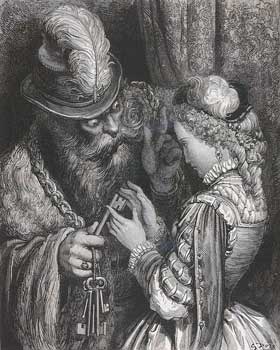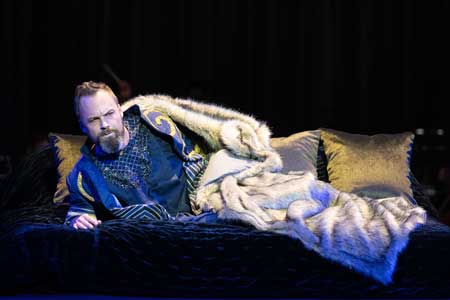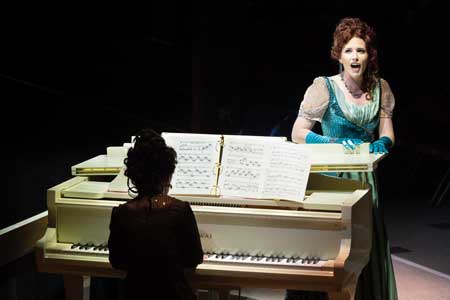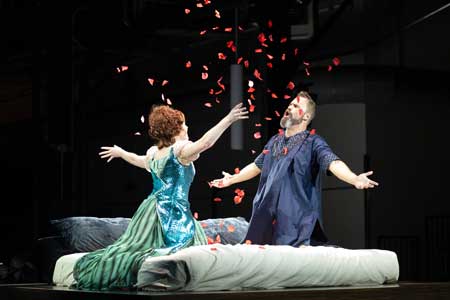Opera, with additional songs
Opera by Béla Bartók
Libretto by Béla Balázs
Arranged by Eberhard Kloke
Songs By Alma Mahler
Conductor: David Angus
Stage Director: Anne Bogart
Boston Lyric Opera
The Terminal @ Flynn Cruiseport Boston
South Boston, MA
March 22-26, 2023
Set Designer: Sara Brown; Lighting Designer: Brian H. Scott; Movement Director: Victoria L. Awkward; Costume Designer: Trevor Bowen; Wig and Makeup Designer: Priscilla Bruce
Solo pianist: Yukiko Oba
With Naomi Louisa O’Connell (Judith); Ryan McKinny (Bluebeard); Wives: Victoria L. Awkward, Olivia Moon, Marissa Molina, Sasha Peterson, Aliza Franza, Cassie Wang

by Gustave Doré
According to the traditional French folk tale, Bluebeard was a rogue and a seducer, and, in this terrific staging of Bartók’s opera, a particularly alluring one. The story is simple: Judith is Bluebeard’s latest wife and she thinks she’s going to turn him around. She wants to lighten up his house, his life, open doors, make Bluebeard into an open and healthy guy. Little does she know that he has, literally, skeletons in his closet, and when she demands that the closet doors be opened, she gets a better sense about what she’s dealing with.

in “Bluebeard’s Castle”
Photo: Liza Volli
Courtesy of Boston Lyric Opera
The drama in this story is all psychological, and Bartók’s music conveys it wonderfully. But what makes this production particularly exquisite is the integration of Anne Bogart’s sparklingly inventive staging with the Boston Lyric Opera’s typically fine and engaging musicality.
Presented in a transformed industrial space in a South Boston cruise terminal – I suppose the overtones of cruising take on new significance here – the staging is nothing short of miraculous. It is done elegantly, without fuss or undue complexity, but it works brilliantly well. Along with Bogart’s inventive genius are the highly admirable contributions of lighting designer Brian H. Scott and choreographer Victoria L. Awkward. With excellent singing and playing, comes forth a thrillingly good production.
Bogart had teamed up with the BLO a few years ago when, in another sort of industrial space – the Harvard gymnasium – they produced an excellent rendition of The Handmaid’s Tale. That was also a dour and a dire story done in a stark environment, but it was done exceptionally well. The BLO has performed other operas at unexpected venues like the skating rink in the North End of Boston, but these collaborations between the BLO and Anne Bogart have worked distinctively well.

Naomi Louisa O’Connell as Judith
in “Bluebeard’s Castle”
Photo: Liza Volli
Courtesy of Boston Lyric Opera
The inclusion and integration of the songs by Alma Mahler is an interesting and curious enhancement to the Bartók that really works. As Anne Bogart and David Angus explained in a talkback after the show, Alma Mahler, who was married to famous composer Gustav Mahler, was a very good composer in her own right, but swept out of the field by her husband who had cautioned her there could be only one composer in this family.
As this selection of songs wrapped around the Bartók opera so clearly evidenced, Alma Mahler was a composer of talent and it was only the sort of domineering by men like her dear husband who prevented her from realizing her talents. That theme, though not as macabre as the tale of Bluebeard, is certainly related to it, and it is this wrapping of the Alma Mahler songs around the opera that underlines the prejudice and exclusion which has so often prevented women from being able to realize their talents.
Naomi Louisa O’Connell is a powerful and engaging Judith and comes fully into her own as the opera progresses. Her earthiness and capacity are evident from the beginning, but it is only as the tragedy of the opera develops that the richness of her voice makes itself most evident. Ryan McKinny as Bluebeard is a stunner from the beginning. His basso rips out of the gate and never lets up. This all may be intended by the trajectory of the narrative – he’s all-powerful and she is captive, but she comes more into her own as the doors open and the tragedy unfolds.
The addition of the Mahler songs, especially at the very end, makes this ascencion by Judith clearer. In the opera, Judith meets the fate of Bluebeard’s other wives. But with the addition of the songs as part of the dramatic coda at the end of this compiled interpretation, she finds retribution. The emergence of Judith’s voice thus makes good sense as this evolution of her character develops and unfolds.

Ryan McKinny as Bluebeard
in “Bluebeard’s Castle”
Photo: Liza Volli
Courtesy of Boston Lyric Opera
Some more detailed notes on the performance:
Opening song by Alma Mahler, replete with painful revelations. Sensitive accompaniment by pianist Yukiko Obat. A pledge of love amid the seated dead wives of Bluebeard.
The orchestra plays. Is this Bartók or Mahler? A little confusing, but what the hell. The acoustics are pretty good for a shipping terminal. Lushly Romantic. Who scored this? (Note: later identified that Julian Reynolds arranged the Mahler songs for orchestra.)
The opera begins. Music haunting and dark. The Bluebeard basso, Ryan McKinny, has a riveting sound. Poor Judith (Naomi Louisa O’Connell) has left her family to come to be with Bluebeard. A strikingly tonal depiction – this is Bartók ? (Note: it’s early Bartók !)
O’Connell’s voice is interesting – rich but not too rich. A lovely, straightforward English rendition of the text is supercasted. Dark and gloomy is your castle! – and how – gets repeated a lot. Judith wants to save Bluebeard and let the light in. Good luck! There is no glory in this castle. he responds. A rumbling, haunting, reflective orchestral commentary.
Further lyrically haunting musical prompts – very evocative. Your castle Judith repeats, a lot. Squiggly string commentaries with descending horns and echoes by winds. We’ll open both together! – a brief foray in a halting major key.
Wonderful lighting – multicolored bars of light from above reflect on the brilliant black floors.
Judith discovers Bluebeard’s torture chamber – uh oh. Red light prevails. A beacon of awareness by the clarinet with echoed squiggles by the strings. O’Connell’s voice grows with the awareness of the perversion. Wonderful pictorial staging. We must open every door, because I love you! Yeah, yeah, sure.
Glistening shimmers of harp as Bluebeard’s secrets are revealed. Gently, softly from Judith, echoed in the orchestra. Then a trumpet fanfare with an eloquently accompanying horn.
The reds and the greens of the bed! Simple but highly effective lighting and design.
Judith want the keys! The vocal lines here so eloquently interspersed with orchestral embellishments.
A wonderful moment with a red cord – blood!
Articulately direct and simple staging and brilliantly designed lighting to enormous effect.
Judith discovers the treasure behind the doors as the solo violin, lovely in its evocations, cries.
Now the dead wives emerge making wonderful zombie-like and kabubi-like gestures. Great choreography.
As the fourth door opens, a warm and glowing horn solo. The wives dance – beautiful, simple, evocative gestures.
Striking how tonal and impressionistic the score is! (Yes, Bartók , but early.)
O”Connell’s voice really blossoms now. Oh, what flowers!
Occasional jets coming in for landings at Logan Airport color the background every few minutes, but the effect, rather than annoying, is kind of interesting.
Bartók would have been a great film composer. He really gets drama.
Judith screams wildly, with pangs of commentary by the orchestra. It’s sounds like a bit of a takeoff on Wagner’s Ring. Could this be a spoof?
Broad strokes by orchestra as Bluebeard holds forth. Amazingly straightforward and tonal. McKinny’s voice resonant throughout.
The overhead jets just add to it all – wonderfully.
It’s all yours now, Judith. Pretty bold. But she’s getting the creeps. Don’t think she’s going to get the windows opened – whoops! But he does want to seduce her.
An orchestral frenzy, running all over. Then the fight. She still wants the doors open – but do you really think that’s going to happen?
Now she pulls and endless black sheet out of the bed – this is really terrific – it’s like a death bridal train. The train turns into a stage size shroud, all black. Judith is like an existential Brunnhilde on a black mountain. Brilliant lighting and staging. The orchestra is singularly expressive.
Lush orchestral avalanche. Are we sure this is Bartók ? (Yes, indeed – early.)
The long and painful seduction, now under the black shroud.
Really suspenseful orchestral ruminations before the opening of the seventh and last door. Judith is pretty upset, understandably. So much for online dating! Oh well, she thought he was a good guy.
Red lights over a bluish stage – wonderful. Whoops – now she sees all the dead wives. The orchestra is deliberate rather than cataclysmic – resignation more than convulsion.
Talk about Me Too! Whoa! The scream of the demon. A significant articulation of perversion. Judith has really bought the farm here. A paean to romantic self-deception!
Now the orchestra screams – wildly!
A wonderful simple choreography of the wives standing in a row.
It ends with Alma Mahler’s song about the enveloping dark, now orchestrated. Beautiful. A touch of jazz in the conclusion. And then, Judith’s long, long sigh in conclusion.
Some notes on the talkback with conductor David Angus and designer Anne Bogart:
Angus noted that they are performing a chamber version of the opera with 28 in the orchestra rather than the usual 100 as is generally used in the concert version of the opera which is the version normally performed. Wanted to add a bit since the opera is short, and decided that the songs by Alma Mahler fit in perfectly. She was a great composer, as evidenced in the songs, but prevented from pursuing her career by her husband Gustav who purportedly told her There is only room for one composer in this family. As well, Angus noted that the pieces played in the salon by Yukio Oba before the performance – held in an anteroom to the performance space – were all by women composers.
Bogart made the point that Alma Mahler became the quintessential key to the whole production. She invoked the image of a sculpture, Levitated Mass at the Los Angeles County Museum of Art (LACMA) by Michael Heizer which employs a heavy weight suspended above the viewer; much like this, she noted, was the heaviness of the male world for such promising talents as Alma Mahler.
Bogart revealed in an interesting and wonderfully candid way how she arrived at the staging of the opening of the different doors in Bluebeard’s castle. She also talked somewhat about the opera as Bartók’s exorcism of his own loneliness, and remarked that, despite the incredible success of the opera early in Bartók’s career, he opted not to write another one.
As Angus and Bogart observed, the addition of the Mahler songs afforded a narrative conclusion to the Bluebeard tale, offering just desserts in the end.
– BADMan (aka Charles Munitz)
Leave a Reply